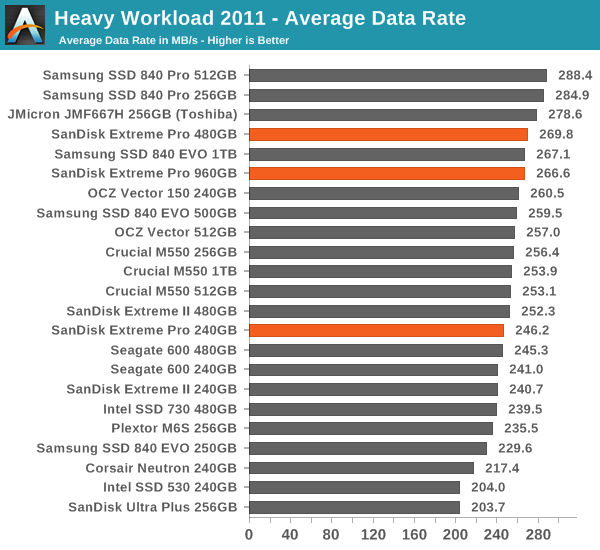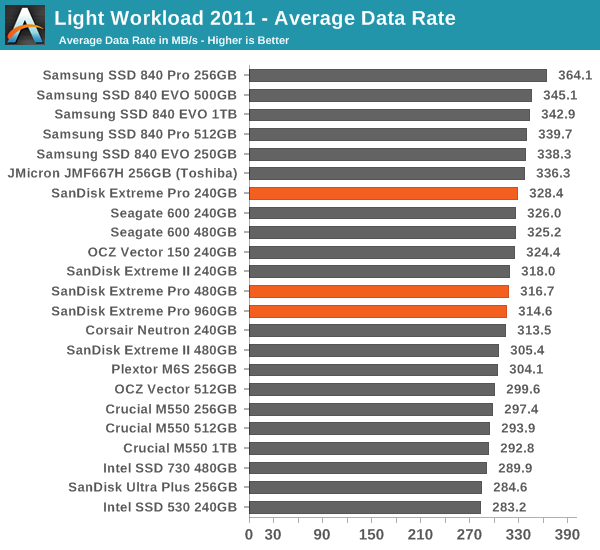SanDisk Extreme Pro SSD (240GB, 480GB & 960GB) Review: The Fastest Just Got Faster
by Kristian Vättö on June 16, 2014 4:00 PM EST- Posted in
- Storage
- SSDs
- SanDisk
- Extreme Pro
AnandTech Storage Bench 2011
Back in 2011 (which seems like so long ago now!), we introduced our AnandTech Storage Bench, a suite of benchmarks that took traces of real OS/application usage and played them back in a repeatable manner. The MOASB, officially called AnandTech Storage Bench 2011 - Heavy Workload, mainly focuses on peak IO performance and basic garbage collection routines. There is a lot of downloading and application installing that happens during the course of this test. Our thinking was that it's during application installs, file copies, downloading and multitasking with all of this that you can really notice performance differences between drives. The full description of the Heavy test can be found here, while the Light workload details are here.

The Extreme Pro does well in our older Storage Benches as well, although as you can see we have gotten to a point where the difference between SATA drives is less than 10% in most cases.











85 Comments
View All Comments
Solix - Tuesday, June 17, 2014 - link
I get the enthusiasm for the increase in bandwidth by going PCIe, but there are other constraints for some of us. What about those of us that already have all of their PCIe slots crammed full to the brim with GPUs and Sound cards and stuff? Maybe vendors can put internal PCIe slots in without the need for using a chassis slot. After all, most of them just have a back plate with nothing right? Or something that lets me use a riser cable and mount it elsewhere instead of burning a precious one of my back panel slots.457R4LDR34DKN07 - Tuesday, June 17, 2014 - link
That is essentially what M.2 does...TelstarTOS - Tuesday, June 17, 2014 - link
Thanks. I really needed to see the performance of the new model before buying the old one on sale :)mapesdhs - Tuesday, June 17, 2014 - link
Kristian, just curious, why did the Vector 512GB top the IOMeter Sequential
Write table? Just seems a bit of an oddity given where it ends up in all the
other tables.
Btw, your AS-SSD tables are amusing in this regard; I ran AS-SSD on my
Vector 512GB, it gave 516.94 seq. read, 502.78 seq. write (topping both
tables), overall score of 1091. Interestingly, although my Vector 128GB
drops its seq. write to 386, the seq. read still stays healthy at 515.18.
I do like the Vector series, they work very well. I bought a Vector-150
128GB; it's seq. write is 10% higher, but the 4K numbers are lower,
resulting in a reduced overall score (989 vs. 1040).
The highest overall score I've had so far was 1147 from an 840 Pro 512GB.
(all done via Intel SATA3 on Z68)
Ian.
mapesdhs - Tuesday, June 17, 2014 - link
Caveat: in general prefer Samsung models for C-drives, for better long termconsistency. Here's the 840 250GB in my 3930K setup:
http://www.sgidepot.co.uk/misc/samsung_840_250GB_H...
Vectors are great for AE cache drives (ditto Vertex4), though my 2700K does
have a Vector 256GB for its C-drive; here's an HDTach:
http://www.sgidepot.co.uk/misc/OCZ_Vector_256GB_HD...
Pretty decent; not as quick/smooth as my 3930K's 840 250GB, though an AS-SSD
run is good:
http://www.sgidepot.co.uk/misc/OCZ_Vector_256GB_AS...
These Extreme Pros look interesting. I might get one to see how they fare for AE, etc.
Ian.
KAlmquist - Wednesday, June 18, 2014 - link
In case anyone missed it,the Sandisk Extreme Pro prices listed on the last page of the article are not real prices because the items were out of stock at the time the reviewer pulled the prices from Newegg. Now the 240 and 480 GB models are in stock for $270 and $400, respectively. All three models are in stock at Amazon.com with prices of $240, $430, and $700.The SSD market is looking like what we often see in the CPU market, with large price premiums for the fastest models. I won't be buying a Sandisk Extreme Pro, but there probably are people who could really benefit from the performance.
Xajel - Wednesday, June 18, 2014 - link
Interesting, the price went up..The 240GB model is cheaper in Amazon now compared to newegg
( A vs. NE ) : $229.99 vs. $269.95 or $0.958/GB vs. $1.125/GB
The 480GB model is cheaper in newegg
( A vs. NE ) : $429.99 vs. $399.95 or $0.896/GB vs. $0.833/GB
The 960GB model is not available in newegg.. but it cost $699.99 or $0.729/GB in Amazon
milli - Wednesday, June 18, 2014 - link
"SanDisk is turning out to be a very dangerous player in the client SSD space. With nearly perfect vertical integration model (they just lack client controller silicon and DRAM), SanDisk has the ability to put against Samsung and Intel who have traditionally held the performance crown."They actually do have their own controller. The U110 and the Standard (and maybe more) use Sandisk's own controller. Granted these are low end.
skarthikeyan - Saturday, June 21, 2014 - link
Hi, shouldn't writes be slower than reads in drives, more so in SSDs? For eg, on http://anandtech.com/show/8170/sandisk-extreme-pro... sequential read for the Extreme Pro 960GB is 438 MBps while sequential write is 371.4. But in the case of random read(98.5) vs write(257MBps for QD=1), write is faster. Why is that the case?skarthikeyan - Saturday, June 21, 2014 - link
Sorry, my comma broke the link, the correct link to that page is http://anandtech.com/show/8170/sandisk-extreme-pro...